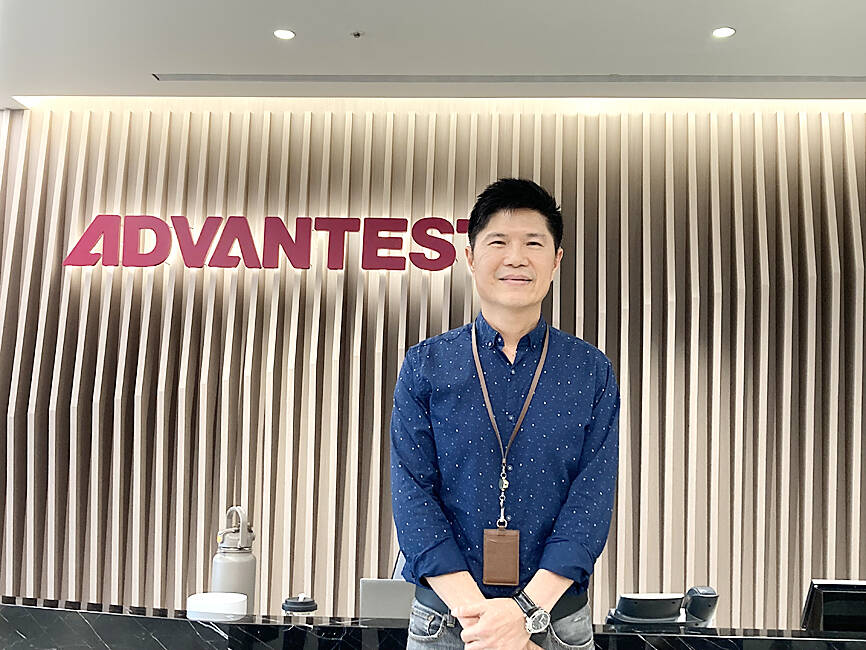Advantest Corp, the world’s largest chip testing equipment supplier, yesterday said that stronger-than-expected demand from Taiwan Semiconductor Manufacturing Co (台積電) has stretched to far longer than the expected six months, driven by a surge in demand for artificial intelligence (AI) and high-performance-computing (HPC) applications.
Normally lead times range from three to four months, but as a majority of AI and HPC chips are packaged using advanced packaging technology, chip-on-wafer-on-substrate, it requires a longer and more complex testing process to ensure every semiconductor die works well before being packaged together, Advantest said.
As a result, demand for Advantest’s equipment is running high, the company said.

Photo: Lisa Wang, Taipei Times
Taiwan is a major consumer of such testing equipment because it plays a major role in supplying AI and HPC chips.
Advantest holds a greater market share in the AI and HPC chip testing equipment market, compared with its 56 percent share of the global testing equipment market.
“The lead time is a critical issue now. Demand has greatly exceeded our original expectations,” Advantest chairman Alex Wu (吳萬錕) told reporters yesterday on the sidelines of a media briefing celebrating the company’s new Hsinchu headquarters.
“We have our hands full now,” Wu said. “We will do our best to satisfy customers’ demand. We hope to shorten our lead times a bit by the end of this year.”
Taiwan is the company’s fastest-growing market, even though China has become its biggest market due to growing demand for mature equipment, Wu said.
Advantest also expects to see an increase in demand for its memorychip testing equipment in Taiwan as local memorychip makers seek to tap into a more affordable high-bandwidth segment, with devices such as PCs and smartphones being equipped with more AI functions, Wu said.
Advantest counts ASE Technology Holding Co (日月光投控), the world’s biggest chip packager, King Yuan Electronics Co (京元電子), Nvidia Inc and Advanced Micro Devices Inc among its customers.
To cope with rising demand, Advantest is expanding its headcount and facilities in Taiwan.
The new headquarters can house at least 400 employees, Wu said.
The company currently employees more than 300 people in Hsinchu.
Advantest has spent NT$200 million (US$6.1 million) on its new headquarters in the Tai Yuen Hi-Tech Industrial Park (台元科技園區), which is also home to semiconductor material analysis company Materials Analysis Technology Inc (閎康) and display drive IC designer Novatek Microelectronics Corp (聯詠).

Real estate agent and property developer JSL Construction & Development Co (愛山林) led the average compensation rankings among companies listed on the Taiwan Stock Exchange (TWSE) last year, while contract chipmaker Taiwan Semiconductor Manufacturing Co (TSMC, 台積電) finished 14th. JSL Construction paid its employees total average compensation of NT$4.78 million (US$159,701), down 13.5 percent from a year earlier, but still ahead of the most profitable listed tech giants, including TSMC, TWSE data showed. Last year, the average compensation (which includes salary, overtime, bonuses and allowances) paid by TSMC rose 21.6 percent to reach about NT$3.33 million, lifting its ranking by 10 notches

Popular vape brands such as Geek Bar might get more expensive in the US — if you can find them at all. Shipments of vapes from China to the US ground to a near halt last month from a year ago, official data showed, hit by US President Donald Trump’s tariffs and a crackdown on unauthorized e-cigarettes in the world’s biggest market for smoking alternatives. That includes Geek Bar, a brand of flavored vapes that is not authorized to sell in the US, but which had been widely available due to porous import controls. One retailer, who asked not to be named, because

SEASONAL WEAKNESS: The combined revenue of the top 10 foundries fell 5.4%, but rush orders and China’s subsidies partially offset slowing demand Taiwan Semiconductor Manufacturing Co (TSMC, 台積電) further solidified its dominance in the global wafer foundry business in the first quarter of this year, remaining far ahead of its closest rival, Samsung Electronics Co, TrendForce Corp (集邦科技) said yesterday. TSMC posted US$25.52 billion in sales in the January-to-March period, down 5 percent from the previous quarter, but its market share rose from 67.1 percent the previous quarter to 67.6 percent, TrendForce said in a report. While smartphone-related wafer shipments declined in the first quarter due to seasonal factors, solid demand for artificial intelligence (AI) and high-performance computing (HPC) devices and urgent TV-related orders

MINERAL DIPLOMACY: The Chinese commerce ministry said it approved applications for the export of rare earths in a move that could help ease US-China trade tensions Chinese Vice Premier He Lifeng (何立峰) is today to meet a US delegation for talks in the UK, Beijing announced on Saturday amid a fragile truce in the trade dispute between the two powers. He is to visit the UK from yesterday to Friday at the invitation of the British government, the Chinese Ministry of Foreign Affairs said in a statement. He and US representatives are to cochair the first meeting of the US-China economic and trade consultation mechanism, it said. US President Donald Trump on Friday announced that a new round of trade talks with China would start in London beginning today,